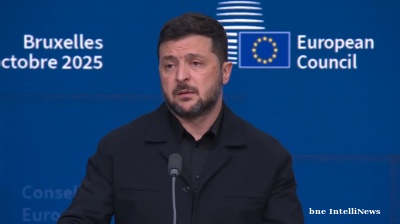Washington has announced that it is extending sanctions waivers for Iran granted under the 2015 nuclear deal, but at the same time it is imposing new measures against several individuals and entities over the Islamic Republic’s ballistic missile development programme.
The US State Department stressed, however, in its September 14 statement that while it was continuing to waive nuclear sanctions, the White House was yet to decide on its strategy as to whether the US should preserve its participation in the nuclear deal.
"Waiving some of those sanctions should not be seen as an indication of President [Donald] Trump or his administration's position on the [nuclear deal], nor is the waiver giving the Iranian regime a pass on its broad range of malign behaviour," State Department spokeswoman Heather Nauert said.
Announcing its latest sanctions related to Iran, the US State Department’s Office of Foreign Assets Control (OFAC) said two Ukraine-based airlines were being targeted with penalties. They are accused of assisting sanctioned Iranian and Iraqi carriers. Specifically, OFAC designated Ukraine-based Khors Aircompany and Dart Airlines for aiding the sanctioned Iranian airline Caspian Air and Iraqi carrier Al-Naser Airlines to acquire US-built aircraft, as well as crew and services.
The sanctions mean the freezing of assets and interests under US jurisdiction and the likely blocking of access to the American financial system.
Also sanctioned, said OFAC, are an entity engaged in activities that support the Islamic Revolutionary Guards Corps’ (IRGC’s) ballistic-missile program and two Iran-based networks. The networks are accused of being responsible “for malicious cyber-enabled attacks against the US financial system.”
Tillerson talks of wider threat
Visiting London on September 14, US Secretary of State Rex Tillerson re-emphasised that the Trump administration is still developing its policy on Iran. Officials were considering the wider threat the country poses beyond the nuclear programme which Tehran in late 2015 agreed to substantially curb in exchange for sanctions relief under the nuclear deal.
"No decision has been made [on our Iran policy and the nuclear deal]," Tillerson said. He added: "President Trump has made it clear [that] we must take into account the totality of Iranian threats, not just Iran's nuclear capabilities. That is just one piece of our posture toward Iran."
Trump is known to be dissatisfied that the nuclear deal gives the US no leverage over Iran’s activities and assertion of its influence in Middle East conflicts such as those in Syria and Yemen. The US president has described the agreement as “one of the worst deals I have ever seen” and has several times claimed that Iran is violating "the spirit" of the deal, particularly through its testing of ballistic missiles. But Tehran rebuts the claim, saying it is not developing missiles capable of carrying nuclear warheads. What’s more, UN and even US watchdogs have concluded in their most recent analyses that Iran is not breaching the nuclear deal.
However, the Trump administration has frequently charged that Tehran breaks the "spirit" of the deal, including by continuing to test-launch ballistic missiles and rockets capable of carrying nuclear warheads.
News
Category 5 hurricane Melissa bears down on Jamaica with Haiti and Cuba in storm's path
A catastrophic Category 5 hurricane was bearing down on Jamaica on Monday, October 27 afternoon with sustained winds of up to 282kph (175mph), threatening to become the strongest storm the Caribbean island has ever experienced.
.jpg)
US senator tells Maduro "head to Russia or China" as warships close in on Venezuela
A senior US Republican senator has warned that Venezuelan President Nicolás Maduro's time in power is running out and suggested he leave the country, as military tensions in the Caribbean continue to escalate.

Milei celebrates resounding victory in Argentina's midterm elections
Argentine President Javier Milei scored a major win for his La Libertad Avanza (LLA) party in Argentina's October 26 midterm legislative elections, as the party obtained approximately 40.84% of the nationwide vote with 99.14% of the votes counted.

Zelenskiy accuses China of aiding Russia’s war effort through industrial and military support
Ukrainian President Volodymyr Zelenskiy accused China of materially supporting Russia’s military-industrial complex, providing key technologies and resources that have enabled Moscow to sustain and scale its war effort against Ukraine.

 Cropped.jpg)


